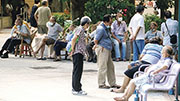Road to 5**:Old age living allowance scheme reform
【明報專訊】The government has proposed reforms to the Old Age Living Allowance Scheme (OALA). Under the new proposal, elderly people will be granted a monthly allowance of $3585, and the asset ceiling will be raised to $500,000. It is estimated that about 50,000 of the elderly currently receiving the normal allowance can receive an additional $910 per month. The number of elderly people eligible for the allowance will also increase by about 100,000 and the extra recurrent expenditure is estimated at about $5 billion.
◆News summary
According to Professor Nelson Chow, professor emeritus of the Department of Social Work and Social Administration at the University of Hong Kong, the actual effects of the reform will be similar to a universal retirement protection scheme. However, the government will face a heavy financial burden in the near future, and he urges the government to levy an old-age pension tax, through which the government can shoulder the expenditure together with businesses and employees.
Financial Secretary Paul Chan points out that after some recurrent measures are implemented, the government's expenditure could increase rapidly due to population ageing. He points out that as the government responds to society's demands for public service and enhancement of service quality, the relevant expenditures also increase. He believes that the increase in expenditures will become a burden to society if it continues for a prolonged period.
Source: Ming Pao, 17 February 2020
■Mock examination question
What changes will population ageing bring to the social development of Hong Kong?
◆Positive changes
· Potential labor force
The Census and Statistics Department estimates that the elderly population will exceed 2.3 million for at least 30 years. Many elderly people who still have good health can be potential members of the labor force. If the government takes the lead in hiring the elderly, they might be encouraged to enter the labor market, which will then promote economic development.
· Development of ''silver economy''
Population ageing can help develop the ''silver economy''. As the elderly population increases, so does demand for health care and nursing services, which is beneficial to the development of related economic activities. For example, in recent years, social welfare organizations have started to develop technological products that can meet the daily needs of the elderly population and bring about economic benefits.
◆Negative changes
· Increased burden on public finances
Population ageing results in a reduced employed population and an increased dependency ratio, which may slow down economic growth. Additionally, as mentioned in the news summary provided, Financial Secretary Paul Chan points out that after some recurrent measures are implemented, government expenditure may increase rapidly due to population aging.
· Increased pressure on the medical system
Population ageing increases demand for services in the public medical system. An increased number of elderly people seeking medical services may increase the strain on the healthcare system as well as the turnover rate for doctors, thus creating a vicious cycle.
Translated by Odyssey Lang
[通通識 第684期]










